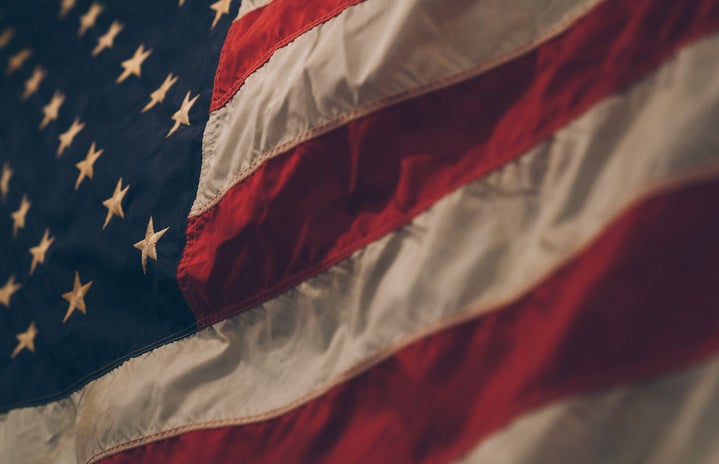If you are a Bernie supporter and you just read the title of this article, I think I know what you might be thinking: “Gosh, this is probably a Republican just saying how people should pay hundreds of thousands of dollars for healthcare because they are themselves rich and don’t pay taxes.” But that cannot be further from the truth. I consider myself a Democrat (and in the global meaning of the word). I believe in universal and accessible healthcare. I’m pro-choice. I believe in climate change. I believe higher education should be affordable. I come from a low-middle income family and I don’t pay taxes because I emigrated from my country to the United States. The latter is particularly the reason why I don’t support Bernie Sanders and I’m glad he is no longer in the run for President. Here, I’ll explain to you a little more of the reasons why I think this way. Maybe, it’ll make you think about the other side of the discussion and the alleged “socialist democracy” that Sanders talked about.

I was born and raised in Venezuela and I had to migrate from my country to come to the United States for my undergraduate studies since it would have been impossible for me to get an education to become a Political Journalist at home. This is because freedom of expression isn’t respected in my country and journalists are severely persecuted and incarcerated. Since 1999 – a year before I was born – my country had been under a dictatorship whose ideology is the Socialism of the 21st Century (the same ideology that Cuba holds presently). I grew up not knowing any other administration than the current one. I grew up not knowing how it is living in a country where the separation of powers is respected. I grew up in a regime that “inspired in the Cuban revolution,” took the most developed country in Latin America, with an exemplary democracy and converted it into one of the poorest, hungriest, and most corrupted countries in the world. All of this under a so-called “socialist democracy.” And sadly, this apparent “revolution” was one of the main inspirations for Sanders’ campaign.
“Our Revolution” is both the title of Sanders’ 2016 book and the name of his political-action organization inspired by his campaign. The revolution that Sanders speaks of is a democratic, populist process leading to (as his book’s subtitle had it) “a future to believe in.” But Sanders’ personal history demonstrates that he was – and still is – rooted in particularly cruel revolutionary movements of the last century.
In early March of this year, the New York Times reported of the friendly ties Sanders made with the Soviet city of Yaroslavl by a trip made in 1988. It also mentioned a sister-cities program that ran during his time as the mayor of Burlington, Vermont. According to the Soviet documents found by the NYT, this outreach was leveraged to further a propaganda campaign intended to “reveal American imperialism as the main source of the danger of [the Cold] war.” In his return from the Soviet city, Sanders praised their healthcare system and their subway infrastructure although, by that time most Russians had already stopped believing in their government’s propaganda because their seams were already visible. Three years after, the USSR collapsed.
However, Sanders’ love for this kind of revolution is part of a larger pattern. “We are very opposed to the authoritarian nature of Cuba,” said Sanders in his controversial 60 Minutes interview last February. “But, you know, it’s unfair to simply say ‘everything is bad.’ When Fidel Castro came into office, you know what he did? He had a massive literacy program. Is that a bad thing, even though Fidel Castro did it?”
This, of course, called out a lot of indignity from the Cuban-American community who have had to flee their country due to the Castro’s dictatorship and their legacy for more than 60 years. The president of the Democratic Hispanic Caucus in Broward County (comprising a large portion of the Miami metro area) and various Democratic youth groups in Florida showed their opposition to Sanders because of their prominent Cuban-American population. This is especially critical to the Democratic party because of Florida’s relevance as a swing-state.
The Western Left’s ill-informed romanticizing of Cuba’s communist dictatorship goes back generations. The Cuban government actually expropriated all significant forms of private property during the 1950s and 1960s, made the internet unavailable to its citizens since December of 2018 and even banned Christmas for 30 years. And in more modern times, Amnesty International and Humans Rights Watch widely accuse its palpable human rights violations, including forced labor camps and arbitrary detention. The NGO Archivo Cuba estimates that the Castro regime executed about 4,000 people between 1958 and 2016. To this day, the face of Che Guevara remains a favored staple on posters and T-shirts in the West. Yet along with Castro and other Marxists, all the Argentinian revolution did was effectively replace Fulgencio Batista’s dictatorship with a bloodier one (more on this topic to hopefully come in a future article).
Nonetheless, did Castro, as Sanders claims, really create a successful literacy program? According to some numbers from UNESCO, 76% of Cuba’s population over the age of 10 was literate when Castro ousted dictator Batista in 1958 (one of the highest rates in Latin America at that time). Following on his 1957 manifesto, Castro sought to improve literacy and launched a program to that effect in 1961, which lasted about eight months. Hundreds of thousands of young volunteers traveled to the countryside, where they taught villagers how to read at a basic level. And the World Bank now estimates Cuba’s adult literacy at 99.8%. But as pointed out by Andy Gomez, Professor Emeritus of Cuban Studies at the University of Miami, this literacy campaign was used as a vehicle for ideological indoctrination and the creation of a pro-Castro cult among Cuban youth. Similarly, Miami Herald columnist, Fabiola Santiago recounts how, despite her outstanding grades at a Cuban elementary school, she was removed from her class’s top rank for refusing to wear the mandated Communist Party red scarf. So, at least in my point of view, a “literacy program” that compromises your basic liberties, could not be defined as successful under any circumstances.
Additionally, Sanders also has a history of praising the corrupted measures of the Cuban regime dating as back as to the 1980s when he traveled to Cuba on a trip organized by the New York-based pro-Castro Center for Cuban Studies. In the Burlington Free Press, he commented that Cuba had made “enormous progress,” and had “solved important problems” such as hunger and homelessness. In an interview, he granted that Cuba wasn’t a “perfect society,” but praised its health system, while remarking that the revolution “is only 30 years old. It may get even better”. We are now 30 years ahead of that time and everyone, but Sanders, knows the revolution did not get any better.
In a 2016 piece for the Daily Beast, Michael Moynihan remarked how Sanders has applauded the Soviet-and-Cuban-backed Sandinistas movement of Nicaragua. Just in the Sandinistas’ first half-year in power, about 2,000 citizens were executed and 3,000 people mysteriously disappeared. By 1999, the Permanent Commission on Human Rights (often referred to as the CPDH) had documented about 14,000 cases of rape, torture, mutilations, executions, and kidnappings. The Sandinistas also mistreated the country’s Miskito indigenous population, forcibly relocating 8,500 of them, according to the Inter-American Commission on Human Rights.
Sanders’ admiration of Latin America’s left-wing dictatorships hasn’t changed 30 years after the fall of the Berlin Wall and I think he’s one of the best examples of what some psychologists define as “peace privilege”— by which people living in peaceful, prosperous countries simply have “no real clue about what it means to survive” in a dictatorship.
In addition to this – and personally taking this subject more to home – Sanders has expressed conflicting opinions about the dictatorship in Venezuela and its humanitarian crisis, differently from many other Democrats who have straight-up condemned the current regime. Sanders’ particular infatuation with Hugo Chávez’s “Bolivarian Revolution” dates back to 2011, when he used his official Senate webpage to promote an editorial board’s claim that “These days, the American Dream is more apt to be realized in South America, in places such as Ecuador, Venezuela and Argentina, where incomes are actually more equal today than they’re in the land of Horatio Alger.” Yet, by 2011, Venezuela’s government already had resorted to imprisoning dissidents, undermining the Supreme Court and closing down opposition media.
Some of Chávez’s proposals were similar to those that Sanders made in the run for 2020, however, Chávez’s proposals ended up in leaving the country in a path of corruption by taking the money destined to accessible healthcare programs, gifting oil to “allied” countries like Cuba and Russia, and expropriating numerous private companies leaving thousands without jobs. After Chávez died in 2013, Nicolás Maduro, his successor, has presided over a continuing national meltdown, with malaria, diphtheria, and yellow fever reappearing after being eradicated from the country. Almost half of Venezuelans reported not eating three times per day, and around five million people—almost 20 percent of the population—have simply left the country. The country is suffering an extreme scarcity of basic foods, medicines and the highest hyperinflation of today’s world. Military courts have prosecuted civilians for crimes against the regime, while security forces have committed summary beatings, electrocutions, asphyxiations, and rapes of detainees. According to Human Rights Watch, Maduro’s forces have executed 18,000 people since 2016. Yet Sanders refuses to even call Maduro a dictator. Sanders has even hired, as a speechwriter, David Sirota, a known Chávez apologist who once described Chávez’s legacy as an “economic miracle.”
The political crisis in Venezuela intensified in 2019 when Juan Guaidó, President of the National Assembly, was sworn as an interim President. A power vacuum occured after Maduro’s second term elections weren’t recognized by the Venezuelan National Assembly and the international community because they were illegitimate and fraudulent. Since then, Guaidó has been recognized as the legitimate President of the country by the Organization of American States and over 50 countries, including the US, Colombia, Canada and Spain. Most Democrat leaders followed suit, but Sanders shocked fellow party members by telling Mexican-American journalist Jorge Ramos he didn’t consider Guaidó to be the legitimate Venezuelan leader.
Since the United States recognized Guaidó, the American leftist groups which Sanders belongs to – in addition to Rep. Ilhan Omar and Rep. Alexandria Ocasio-Cortez – have called it “US Imperialism.” Even though the US has some historical cases of interfering in Latin America in the last century, there is a big difference between invading a nation and denouncing widely known human rights violations. Inaction towards these violations in Venezuela means also being guilty of them.
As a response to Washington’s support of Guaidó, three dozens of people from organizations backed by Sanders – Code Pink, ANSWER Coalition and Popular Resistance, and the Black Alliance for Peace –, illegally occupied the Venezuelan Embassy in Washington for around a month during the Spring of 2019. None of them were Venezuelan nor spoke any Spanish. They impeded the legitimate Venezuelan Ambassador to be allowed inside the embassy to work for us who actually hold that citizenship and need its services. It was incredibly heartbreaking how these people are fighting for a cause which is killing people and separating families, and also it’s incredibly ironic how these people are fighting against an alleged invasion while performing an invasion themselves. A feminist organization like Code Pink fights for this cause when Chávez and Maduro’s regime goes against feminism: it hasn’t legalized abortion, protected victims of gender and domestic violence, or provided contraception. It threatens mothers of patients if they denounce the health system, and doesn’t allow the import of tampons.

Even though Sanders’ foreign policies and ideology standpoints are the biggest reasons I don’t support him, I also must express why I don’t agree with some other of his proposals.
Just like former US President Barack Obama said in a video he posted mid-April endorsing Joe Biden, “of course Democrats might not agree on every detail of the best way to bring about each and every one of these changes, but we do agree that they’re needed.” So, as I mentioned before, I support universal and affordable healthcare and higher education. One of the biggest cultural shocks for me coming to this country was finding out how expensive these two necessities are. However, I believe everyone should be granted the opportunity to decide what kind of service they want to have and they should be allowed to chose from a spectrum of varieties, including the private option. Especially in healthcare, if someone wants to pay for having a service not controlled by the State, why shouldn’t they be allowed? That is how most countries in Europe, for example, work. In Germany, France, Spain, the Netherlands, etc. everyone is covered by the public healthcare system, but if someone wants to pay for private healthcare, they also have that option – “option” is the key-word here! This is the country of opportunities. Part of the western development is that you have the liberty to make choices: just like you decide your favorite milk among a wide variety of options, you should be able to choose which services you want to from a variety of healthcare options (and you must have at least one completely available to you that is completely functional regardless of your income!).
In these western European countries I mentioned, the majority of the population chooses the public option not only because it’s economically better, but also because in a lot of areas the public option overcomes the private option in terms of technology since their governments invest a lot in their public healthcare. That is what a true social-democrat should aim for; instead of trying to eliminate private insurance and make people job-less, they should propose to invest and improve Medicare so that it’s a better service than private healthcare and it’s only logical for everyone to use it. I know in the Nordic countries, that Sanders always mentions, the healthcare system only offers a public option and they work, but it’s just illogical to compare Norway that has a population of 5 million inhabitants and Sweden with a population of 10 million, with the US whose population goes above 300 million. We would need 30 to 60 times these countries’ budgets and that is just unrealistic to achieve in one (and even two) presidential terms.
Touching on another of the main problems of today’s America, I strongly believe Sanders wouldn’t have been a good President regarding the issue of immigration. Just the fact that he doesn’t recognize the issues millions of Cubans, Nicaraguans, Argentinians, Bolivians, Ecuadorians, ex-Soviets and Venezuelans had to go through to the point of escaping their countries to seek refuge and better opportunities in the United States, is enough proof to show how can condescending he could be with this issue. As an immigrant, I can tell you that one always dreams of being able to come back to their country in better circumstances, but if Sanders doesn’t fight to improve the situations of leftist corruption in these countries, how can he even begin to protect immigrants? Not to mention that if his platonic administration doesn’t consider the situations we come from as hostile and dangerous, the chances of granting us a refugee status decrease significantly.
Finally, the last reason why I think Sanders would be unsuitable for the Democratic party in 2020 is that with him, we would not be able to win the swing states, and that is a crucial factor if we want to avoid 2016 from repeating itself. On the party’s favor, there are a lot of Republicans (and surprisingly, the most Christian ones) that don’t support Trump’s sexually abusive and extramarital actions as well as his racist and discriminatory tone. These Republicans don’t want to re-elect Trump, but they also don’t support Sanders’ radical ideas. Nonetheless, and strategically speaking, these Republicans are the key to win some of the most important swing states – a good example of this is the Florida. Therefore, it’s in the Democratic Party’s best interest in winning 2020 to come together and support a candidate that speaks to all the necessities of the Party and doesn’t compromise them while also attracting this body of orphan Republicans who don’t want to give the current President a second term.



